TentBox Lite XL review: a roof-top car-camping experience like no other
Spacious and well-made, the TentBox Lite XL is an adventurous solution for families or couples wanting a spacious and lofty basecamp
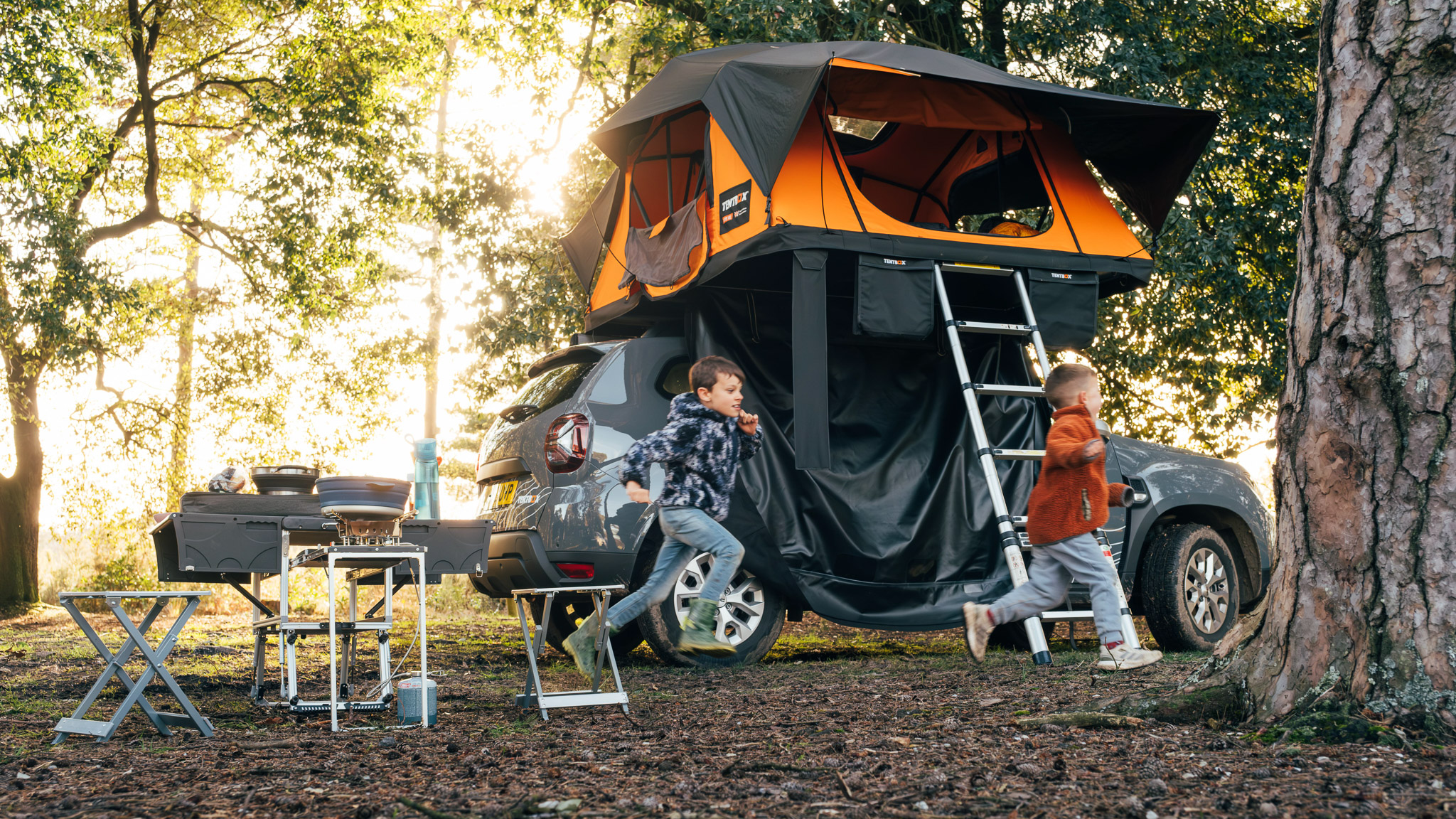


It’s not as quick or as simple to set up as the TentBox Classic 2.0 or Cargo 2.0 models, but the extra faff is justified when you consider the generous amount of room inside. It will sleep four adults (just about) but is also perfect for couples or those with young kids. Granted, it requires a hefty initial outlay, but it’s super easy to pitch, and there’s something comforting about being raised up off the ground, especially when it's tipping it down.
-
+
Lots of room inside
-
+
Faster to set up than a regular tent
-
+
Lots of handy features
-
+
Water and wind-proof
-
+
Looks cool
-
-
A climb to get in and out
-
-
Tent poles are a faff
-
-
Interior zips can be fiddly
Why you can trust T3

If you’ve seen a vehicle cruising around your neighbourhood with what looks like a giant pizza box atop its roof, it is highly likely that it is a rooftop tent and even likelier still that it is from British company TentBox.
The business has been going since 2014, but the south-coast company has grown rapidly since around 2017, partly aided by the pandemic and spurred on by society’s newfound love for The Great Outdoors.
Roof tents, in particular, have a certain social media appeal thanks to their ability to be pitched anywhere and the overlanding safari-cool associated with sleeping on top of your car, van, or pickup truck.
Are they worth the hefty price, though, and does the TentBox belong in T3's best tent guide? Let's find out.
TentBox Lite XL review
Price and availability
Available to buy directly from TentBox, the Lite XL model has an RRP of £1,895. This includes everything you need to get started, such as the telescopic ladder, the dual-layer memory foam mattress and the removable rainfly cover.
There are a number of online retailers, including Amazon, that also stock the model, but they tend to stick to the RRP, so it makes sense to buy directly from the seller to make the most of their reputable after-sales and customer service.
Currently, the Southampton-based company offers its Classic 2.0, which pops upwards on gas struts, and a front pivoting Cargo 2.0 model, which can house other items on its solid top, such as bikes or kayaks.
Get all the latest news, reviews, deals and buying guides on gorgeous tech, home and active products from the T3 experts
There are also two book-opening or fold-out models in the TentBox Lite 2.0 and the Lite XL, which we tested here. This is the largest tent in the current range, weighs 62 kg and will sleep four adults at a push.
It can be fitted to pretty much any vehicle that can handle the overall mass (so long as it can also house roof bars), with the installation taking around 30 minutes, according to TentBox.
It’s available in Slate (a sort of dark blue/grey), Sunset (bright orange) and Forest (a cool green), while the company will also sell you a bunch of accessories, from handy boot bags to side awnings and its superb KitchenBox, which we will get on to later.
Design and build-quality
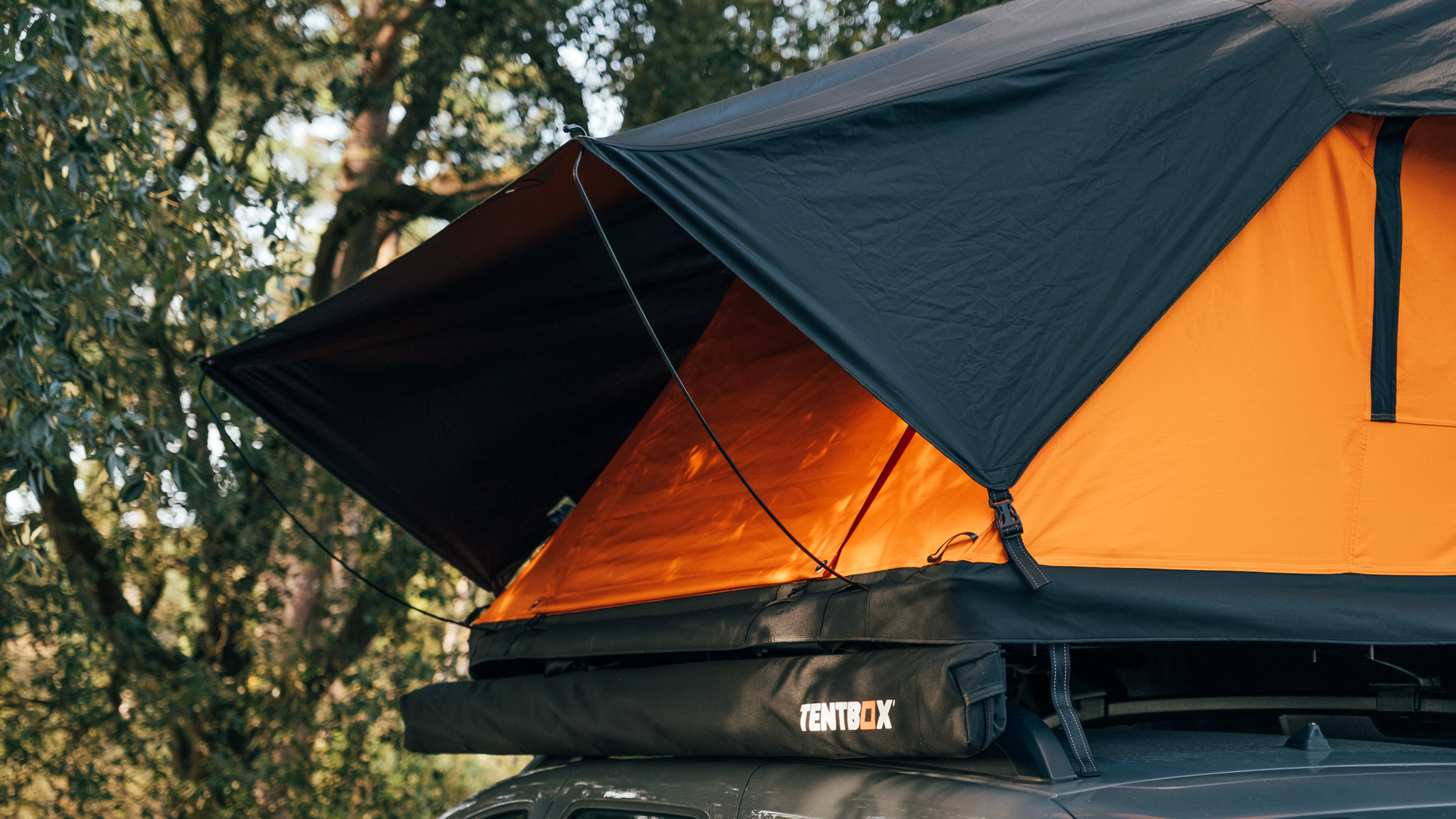
According to TentBox, all fabrics used in the construction of the Lite XL feature a C6 DWR (Durable Water Repellent) coating and UV50 sun protection to stop it from bleaching over time.
The tent’s main material is 600D polyester PVC, with a hydrostatic head waterproof rating of 5000mm. This provides a decent barrier against light to heavy showers, but there’s also a 210D polyester 5,000m removable rainfly cover that neatly sits over the top, effectively doubling your protection against a watery night’s sleep.
This rainfly is pegged out with flexible poles that attach to pre-drilled holes in the Lite XL’s frame, keeping the rain cover away from the rear, sides and front porch area, theoretically channelling the wet stuff away from any important areas.
The tent’s main frame is made up of lightweight but strong aluminium, while ‘industrial grade’ YKK zips and silicone sealant tape have been used throughout to ensure additional robustness and protection from the elements.
Although we wouldn’t recommend it, the tent has been tested in winds up 39 mph, with additional guy ropes and reinforced attachment points thrown in into the package to keep the base of the tent, which isn't attached to the roof of the car when fully opened, from spontaneously flying shut during a gale.
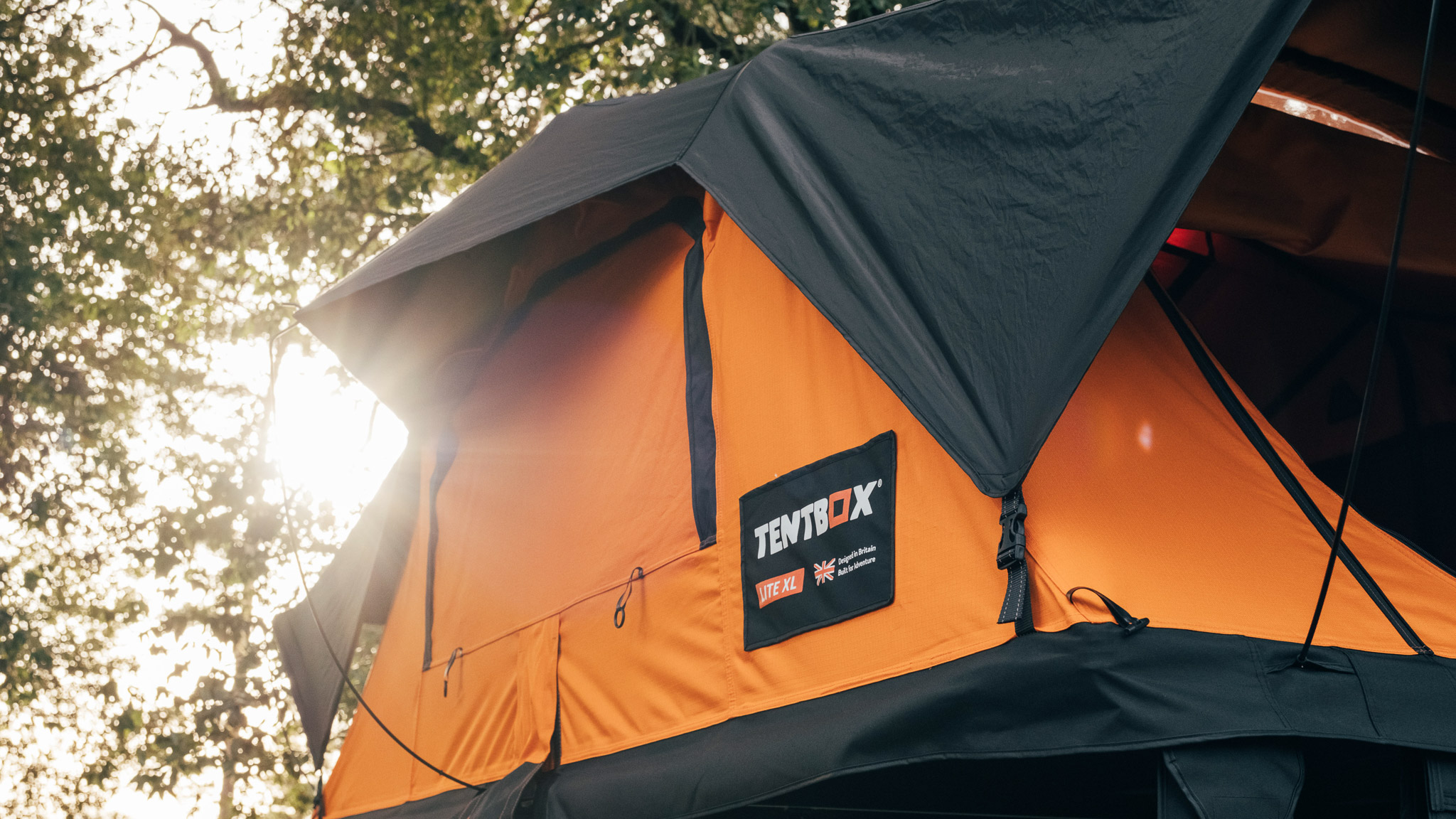
Everything feels well put together, and there are some neat and carefully considered touches, such as the ‘lay-flat’ ladder rungs, which literally lay flat when the ladder is at an angle, making it more comfortable to climb in bare or socked feet.
TentBox also sells a handy boot bag that hangs from the base of the tent and allows for muddy shoes and boots to be taken off and stored when at the very top of the ladder, saving the inside of the tent - and your sleeping area - from nasty stains and smells.
The only slight issue we encountered during our loan was that one of the buckles that kept the corner of the removable rainfly cover had come away at the stitching, which could have been down to a previous loan mishap or the result of some pretty windy weather.
In addition to this, the external aluminium frame struts that keep the rainfly away from the main body of the tent came unseated from their fabric pouches during initial set-up. Nothing major, but it was a bit fiddly to get them back into place.
Set-up and pack away
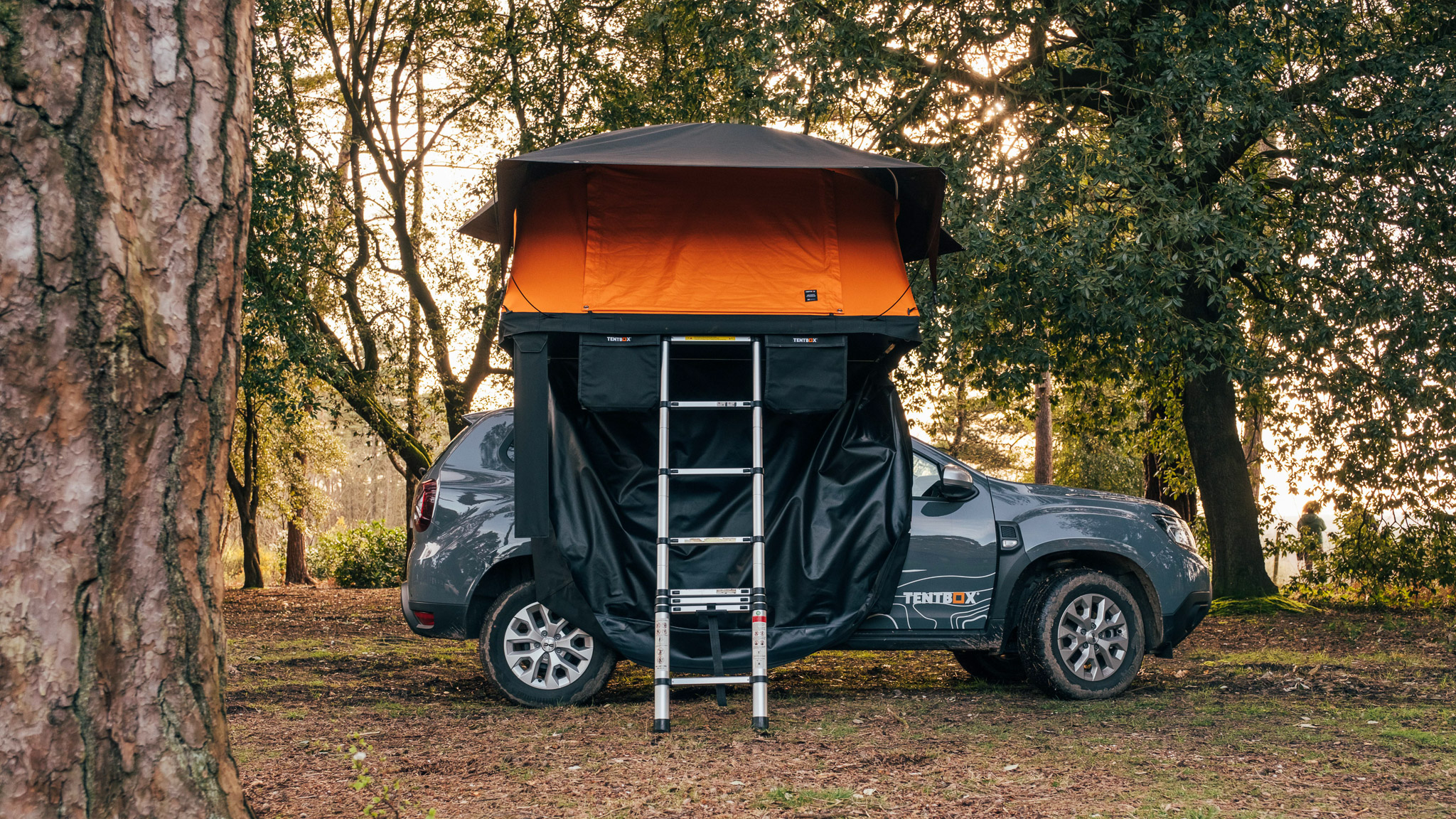
The model we tested was already fitted to the roof rack of a TentBox-branded Dacia Duster, so we didn’t have to deal with hefting the 62kg unit up, thank goodness. However, TentBox says this can be done in around 30 minutes, but we’d suggest you employ the assistance of a couple of burly chums to help.
Once in place, the Lite XL took up most of the Dacia’s roof, and unlike the Cargo 2.0 model, you can’t place further items on top of the package, so the remaining storage space for camping essentials was down to the Duster’s diminutive boot. Seeing as the Duster isn’t exactly endowed with horsepower, the additional weight on the roof was noticeable during driving, as was the additional wind noise.
But once checked in to our chosen campsite, setting up the tent was a doddle - especially as we had been given a masterclass by one of TentBox’s product specialists before leaving. Unzip the hardy protective cover, loosen a couple of straps and it’s as simple as pulling on the telescopic ladder to unfurl the tent and have it spring to life.
All going well, this should take a couple of minutes, but as we previously mentioned, the aluminium supporting poles for the rainfly came out of their seating and we had to clamber on the Duster’s tyres to sort.
Secondly, putting in place the eight or so flexible poles that give the rainfly its structure can be a little tricky at first. The poles for the entrance are easy enough, as these can be reached from the ladder, but the poles for the side windows and rear require a bit of vehicular gymnastics. Also, great care must be taken to ensure these highly flexible poles don’t ping out of your grip and inadvertently hit a windscreen. We can imagine a few Autoglass enquiries might arise from this.
Seeing as the mattress lives inside the TentBox Lite XL, it’s just a case of tossing in a couple of sleeping bags, some pillows and whatever lighting and entertainment you require once the tent is in place. Compared to a typical ground tent, especially those that require poles, the set-up is ten times faster, if not more.
Pack-away is essentially the same process, just in reverse. Although there is some fiddliness in tucking away any excess tent and locating the zip for the main durable cover. Compared to some of the other TentBox models, the process is a little more involved, but it’s still so much easier than any other inflatable or poled tent I’ve had to live with.
Performance
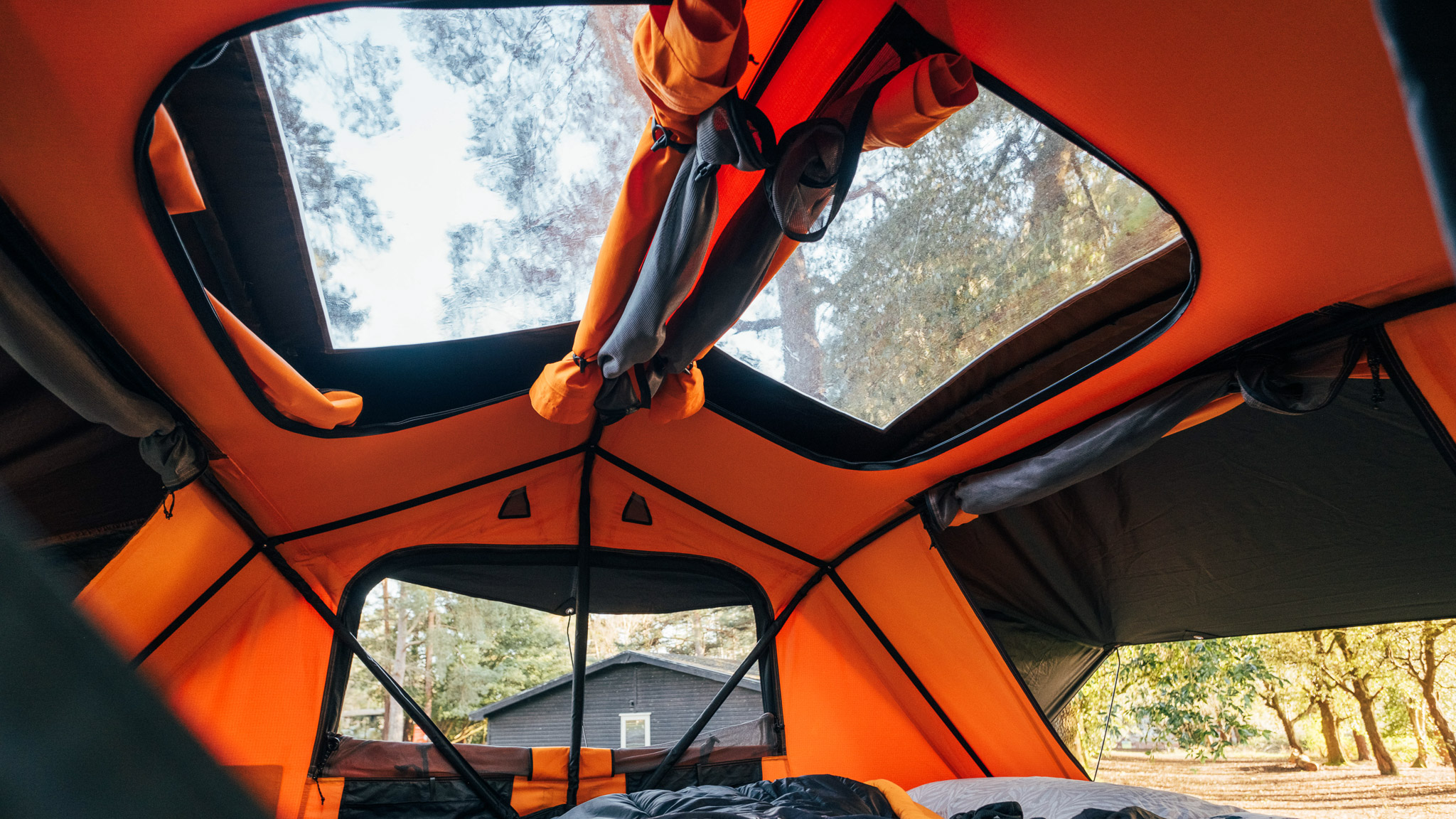
Camping in the UK in March is an interesting experience, with the weather serving everything from gale-force winds to patches of sunshine and torrential downpours. As a test of the tent's abilities, nothing beats it.
The TentBox Lite XL stood up to the weather admirably, proving quick to pitch, even when it was blowing a gale, and remaining dry throughout the several nights under canvas. A decent sleeping bag is a must at this time of year, but the Lite XL dealt with condensation well, offering a number of small windows and roof ports to increase airflow throughout.
What’s more, TentBox even offers a £245 thermal insulation kit for the interior, should you wish to camp out in really frigid conditions, but we managed to remain comfortable with just thick winter sleeping bags and some body heat.
In terms of room, there’s enough space inside for four adults, but you will be getting to know these fellow adults intimately. The same goes for any other tent, though, as it may be advertised as being able to sleep five or six, but really that means it is plenty roomy enough for a family of four.
During this test, I slept with my two younger children and we had loads of room to move around and even get changed in the morning. There are plenty of places to hang lanterns and rig up holders for tablets and smartphones. There are also a number of handy pockets on the sides for keeping phones and head torches within arm’s reach at night.
Perfect if your little one needs to pee, which mine did. Obviously, climbing down a ladder at 4 a.m. with a desperate toddler and a head torch for illumination wasn’t ideal, but it wasn’t exactly TenBox’s fault.
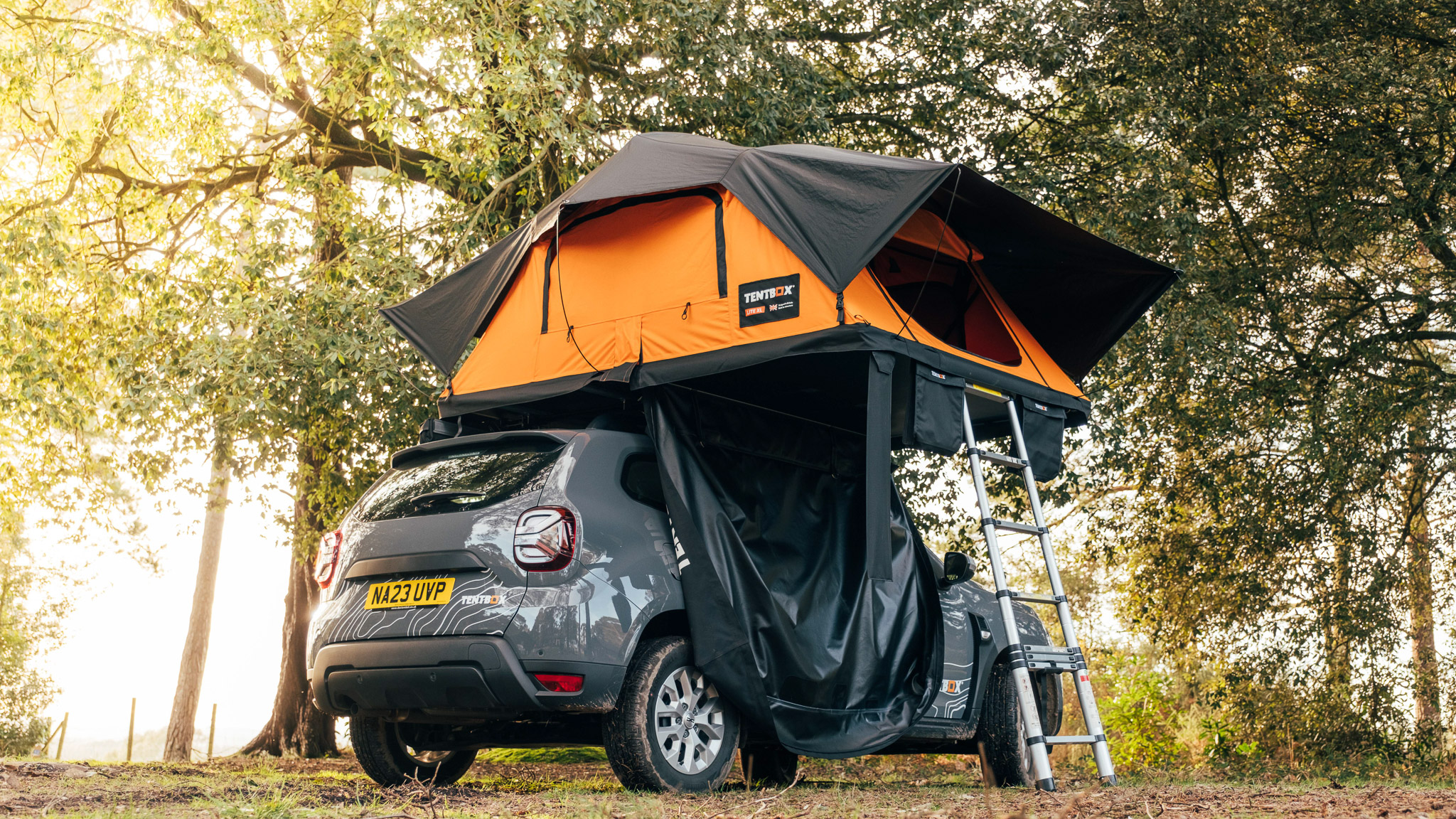
Pitching on a nice flat spot is also essential with a TentBox as it is with any other ground tent, which may require chocs to place under the wheels of your vehicle. But the dual-layer memory foam mattress proved perfectly comfortable, and being raised off the ground keeps the base of the tent away from any pooling water during storms.
There was a little rocking in higher winds, but this is likely due to the fact that the tent was pretty high when perched on top of a Duster. Stick it on an estate car, and it wouldn’t feel so exposed to the elements. With this in mind, it’s also important to remember to turn off the vehicle’s alarm system, as that rocking motion can set off sirens, and the campsite will collectively hate you for that.
Perhaps the only minor quibble I found was that some of the internal zips for the window panels were fiddly, given that they run behind some of the interior pole structure, while the zip on the front porch was exceptionally tight. But this likely required a bit of fabric adjustment to get it just right.
Those small things aside, the double skylight feature was excellent, and it was fantastic to open these up at night to stare up at the stars and again in the morning to take in the picturesque pink sun rises.
TentBox KitchenBox
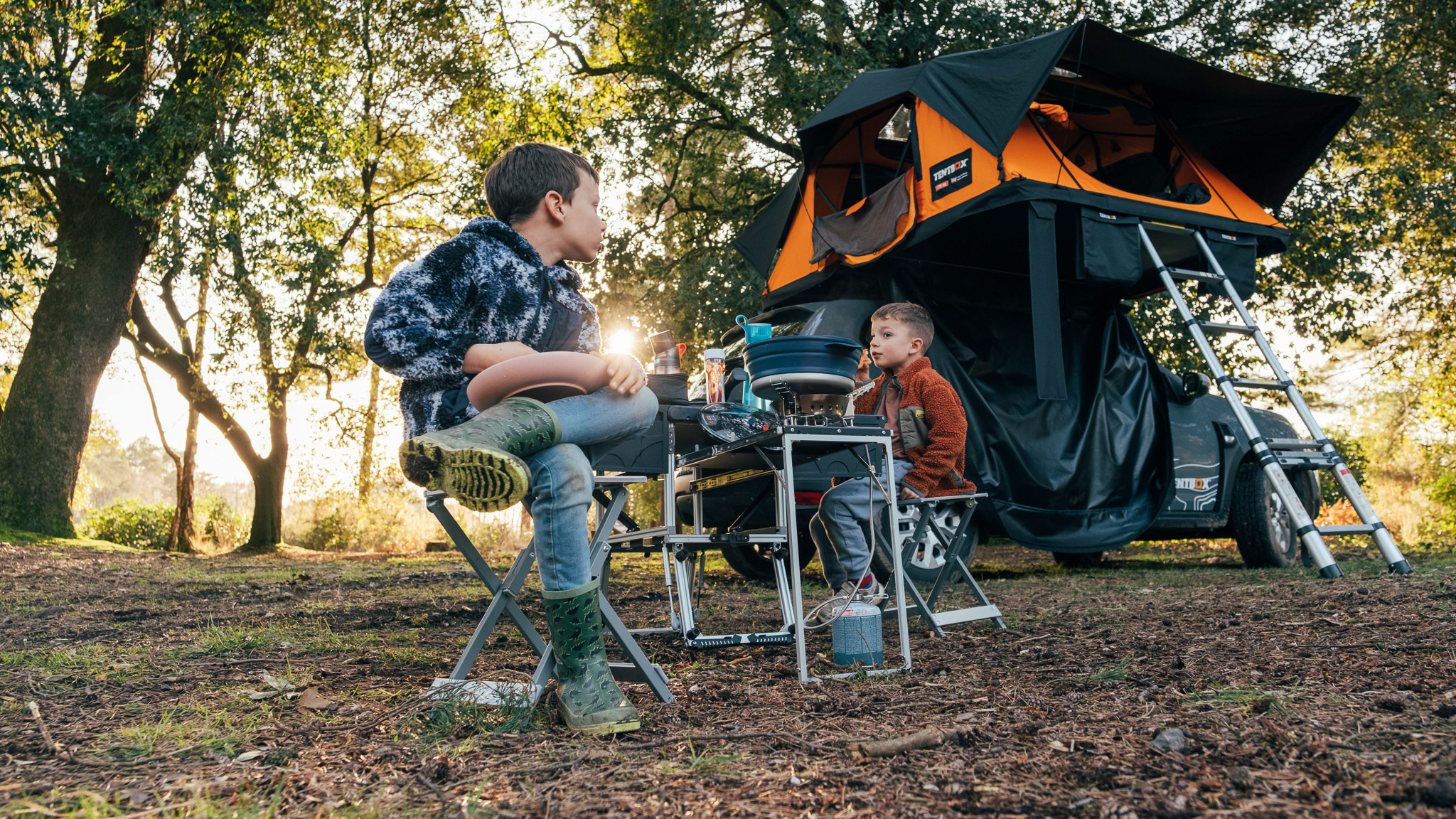
A special shout out to the TentBox KitchenBox, which arguably warrants a standalone review. This neat box of tricks includes a high-performance altitude stove, which can boil a kettle in record time and uses bog standard C100 or C500 gas canisters, which are available pretty much everywhere.
What’s more, the box folds out to create a table, complete with hidden chopping boards and preparation surfaces, two folding stools and a non-stick saucepan with a clever detachable handle. There’s also room for a small bag that contains cutlery, steel dishes, bowls and containers for cooking oil and condiments.
The entire thing weighs under 20kg and securely folds down into a robust cube that is no larger than a weekend bag. It easily slid in and out of the Dacia Duster’s small boot thanks to it being on wheels, while the telescopic legs neatly folded out so the table extended to a height that was comfortable enough to sit around.
It costs £495, which is a little on the eye-watering side, but we’ve not seen anything else quite like it and imagine it would cost a similar figure to theoretically build your own from products already existing on the market. It’s incredibly well-built, aside from the distinctly plastic cutlery, and genuinely convenient - saving lots of precious cargo space in the process.
Verdict

There’s no denying the simplicity of a TentBox, as it spells the end of painfully long set-up and pack-down processes when arriving at your chosen spot in the pouring rain. It also opens up plenty of opportunities to camp well beyond the confines of well-trodden campsite territory, promoting spontaneous adventures under the stars.
The Lite XL is absolutely cavernous inside and will perfectly suit a couple or even a couple with a young family. We’d argue that four adults would be beyond cosy, but it is certainly doable.
Granted, it’s an expensive piece of kit, but we would argue that it goes beyond your standard ground tent with the added simplicity and ease of pitching. Throw in some of TentBox’s official accessories, such as the gazebo-like Living Pod and Universal Side Awning, and you have quite the mobile palace for impromptu adventures.
Also consider
There are a number of companies offering rival roff-top solutions, including the Swedish brand Thule. Its Approach L model (retailer link) is of a similar design but costs upward of £2,799. Autohome is also an experienced name in the roof-tent business, often supplying major automotive manufacturers with bespoke solutions, although prices massively vary.
Finally, Decathlon (also retailer link) has got in on the action with its bargain £1,149.99 Roof Tent MH500. But it is only really big enough for two adults and its weather-proofing is more questionable than the TentBox offering.
Leon has been writing about automotive and consumer tech for longer than he cares to divulge. When he’s not testing the latest fitness wearable and action camera, he’s out in a shed fawning over his motorcycles or trying not to kill himself on a mountain bike/surfboard/other extreme thing. He's also a man who knows his tools, and he's provided much of T3's drills coverage over the years, all without injuring himself.
